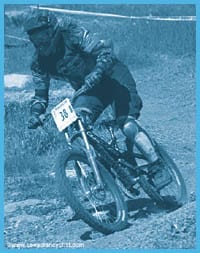Michelle Dumaresq didn’t set out to be an international symbol for transsexual rights, it just happened.
“I just wanted to race a bike! I didn’t really set out to change things.”
Two weeks ago, Dumaresq, 32, was named to the Canadian women’s downhill mountain biking team, which will compete in the World Mountain Biking Championships in Austria at the end of August.
Dumaresq started racing competitively a year ago, winning three of her races and placing second in two. She began competing after she met a group of women training for downhill mountain biking, who encouraged her to join them. It was a natural transition, since she has been biking since she was eight years old.
One of those women was Sylvie Allen, whom Dumaresq credits with helping her to become as fast as she is now. Allen and Cassandra Boon are now two of Dumaresq’s teammates, and two of her most vocal detractors.
Dumaresq says they didn’t have a problem until her racing license was returned to her in April after being revoked last winter, and it became clear that she was not going to stop racing.
The International Cycling Union, competitive cycling’s independent governing body, revoked her license last winter because she is transsexual. The Canadian Cycling Association lobbied to have it returned, arguing that Dumaresq’s birth certificate which she had changed – legally identifies her as female, so she should be able to compete in the women’s category. The ICU relented, and released a statement that they will never revoke her license again.
Dumaresq, Allen and Boon are the three top Canadian women in their category she has lost to them as many times as she has won.
“It’s only when you start winning that people say, ‘You can’t race, you must have an advantage.'”
Allen and Boon have suggested the creation of a “transgendered” category for competitions. Such a category would mean easy wins for Dumaresq, as she would be the only one in it.
But her teammates are not the only ones criticizing Dumaresq. She has also been attacked in the press. She knows she’s in the middle of a controversy, but she actually welcomes discussion of the issues.
“People don’t have to agree with me racing,” she says. “But if you don’t, tell me why.”
Because of the controversy, Dumaresq has also become a role model, albeit “a very reluctant one.” Although she has been involuntarily thrown into the media spotlight, she wants to publicize her story, so that others can have the transsexual role models she never did.
“If I can stop one kid from thinking their life’s over, that’s pretty cool.”
Even without any positive trans role models, Dumaresq has been lucky enough to get lots of support from her family, friends and coworkers. Her parents have become advocates for trans rights.
“Their attitude is amazing,” Dumaresq says. She adds that her father’s reaction to her coming out was, “cool, I’ve got another daughter.” She started hormones at 22, and underwent surgery at 25.
Dumaresq has been a steel worker in the same factory since she was a teenager. She continued to work there throughout her transition, and says that everyone she worked with was very accepting.
Despite the adversity she has faced, Dumaresq is happy with what she has accomplished.
“Life has just turned out so much better than I’d ever anticipated.”

 Why you can trust Xtra
Why you can trust Xtra


